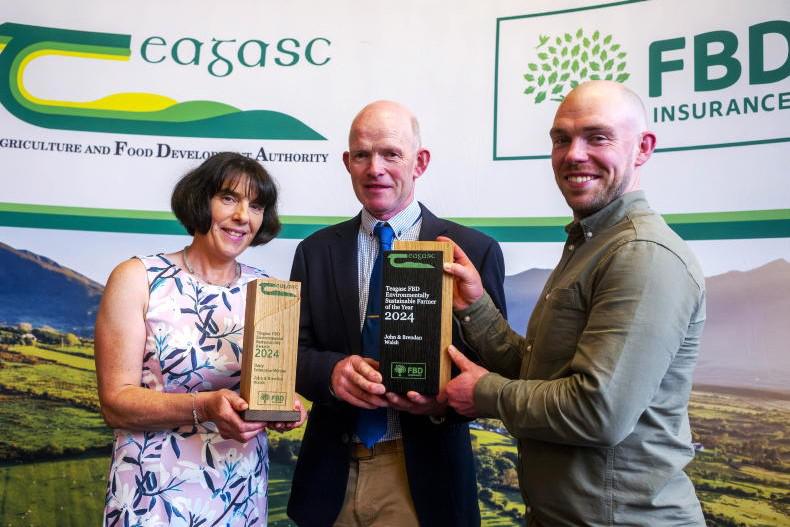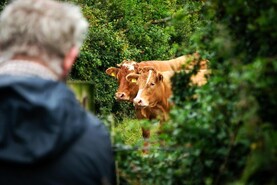Farming in south Tipperary near the village of Ballylooby, John and Brendan Walsh were recently crowned overall winners of the inaugural Teagasc/FBD Environmental Sustainability Awards.
With the help of John’s wife Maria, his two daughters Helena and Claire and local labour, the team from Tipperary is milking 165 cows and runs a small beef enterprise on a 264ac block of land.
Clover has been the champion on this farm, allowing the Walshs to significantly cut their chemical nitrogen usage.
Currently, 65% of the farm has a high or medium clover content, with red clover in the silage swards. The clover has allowed Brendan and John to cut back on chemical nitrogen application from around 220kg/ha in 2020 to 115kg/ha in 2023.
This represents a drop of 48% in chemical nitrogen usage in three years.
Meanwhile, 87% of the chemical nitrogen used on the farm is now in the form of NBPT-protected urea.
Trees are planted every year on the farm and hedges are allowed to grow up and out to maximise their value for biodiversity, but also carbon capture.
The nitrogen surplus on this farm is well below the national average of 159kg N/ha, sitting at 91kg N/ha, reducing the risk of nitrate leaching into waterways.
“The reduction in nitrogen is absolutely huge and we’re still able to keep going,” Brendan said.
“Over the years, we’ve been focusing on breeding a more efficient type of cow that will convert grass into milk solids.
“We’ve planted two new hedges. As regards whitethorn, we are leaving it grow every 50 or 60 metres.
“We also have escaped hedgerows on the farm that are allowed grow up high into a full tree line. Every year, we plant something somewhere – whether it’s a small pocket of trees or a few trees here or there.
We’re willing to try a lot of things but also willing to accept the failures
“We have a stream running along the northern boundary of the farm and the ground around that would be wetter ground that is used mainly for the dry stock. At its narrowest point, it’s 30m from our more intensive ground and that’s like a natural buffer zone.
“We’re harvesting rainwater since 2020 and we have two 20,000l tanks that will actually wash down the yard above for 20 days. We’re willing to try a lot of things but also willing to accept the failures,” John said, after collecting their award.
The Walshs have incorporated paddocks that get zero nitrogen whatsoever with some paddocks chemical fertiliser in over two years.
As well as the inclusion of clover, the cut in chemical nitrogen has been helped by using GPS equipment in order to reduce waste.
While their chemical nitrogen usage has increased slightly in 2024, due to poor grass growing conditions and what proved to be a challenging year for clover, the Walshs plan to get back to 2023 figures again.
Speaking to the Irish Farmers Journal following the award ceremony, John said it was an honour to get the win.
A great privilege
His son Brendan said: “When you look at the different farmers who were here today – there’s a lot of well-known names there that I’ve come across down the years and they’re fantastic farmers. To be up against them, it’s a great privilege. We weren’t expecting to win.”
Professor Frank O’Mara, director of Teagasc, said the new Teagasc/FBD sustainability award is a celebration of the progress farmers have made, and are making, to improve environmental sustainability on their farms while continuing to produce high-quality, nutritious food, in a profitable manner.
“Congratulations to all finalists and award winners. The agri-sector needs all farmers and all involved in the sector to firmly focus on improving water quality, reducing emissions and enhancing biodiversity. The 16 finalists in these awards are excellent ambassadors for what is being done on family farms around the country,” he said.
The other award winners in the Teagasc/FBD Environmental Sustainability Awards were:
Enterprise winners
John and Brendan Walsh – dairy.Aidan Maguire, Meath – dairy-beef.Shane Keaveney, Roscommon – suckler beef.Brian Nicholson, Kilkenny – sheep.Tom Barry, Cork – tillage.Milking 165 cows on a 264ac block.Reduced chemical nitrogen use by 48% since 2020.87% of chemical nitrogen is protected urea.On-farm nitrogen surplus of 91kg N/ha.
Farming in south Tipperary near the village of Ballylooby, John and Brendan Walsh were recently crowned overall winners of the inaugural Teagasc/FBD Environmental Sustainability Awards.
With the help of John’s wife Maria, his two daughters Helena and Claire and local labour, the team from Tipperary is milking 165 cows and runs a small beef enterprise on a 264ac block of land.
Clover has been the champion on this farm, allowing the Walshs to significantly cut their chemical nitrogen usage.
Currently, 65% of the farm has a high or medium clover content, with red clover in the silage swards. The clover has allowed Brendan and John to cut back on chemical nitrogen application from around 220kg/ha in 2020 to 115kg/ha in 2023.
This represents a drop of 48% in chemical nitrogen usage in three years.
Meanwhile, 87% of the chemical nitrogen used on the farm is now in the form of NBPT-protected urea.
Trees are planted every year on the farm and hedges are allowed to grow up and out to maximise their value for biodiversity, but also carbon capture.
The nitrogen surplus on this farm is well below the national average of 159kg N/ha, sitting at 91kg N/ha, reducing the risk of nitrate leaching into waterways.
“The reduction in nitrogen is absolutely huge and we’re still able to keep going,” Brendan said.
“Over the years, we’ve been focusing on breeding a more efficient type of cow that will convert grass into milk solids.
“We’ve planted two new hedges. As regards whitethorn, we are leaving it grow every 50 or 60 metres.
“We also have escaped hedgerows on the farm that are allowed grow up high into a full tree line. Every year, we plant something somewhere – whether it’s a small pocket of trees or a few trees here or there.
We’re willing to try a lot of things but also willing to accept the failures
“We have a stream running along the northern boundary of the farm and the ground around that would be wetter ground that is used mainly for the dry stock. At its narrowest point, it’s 30m from our more intensive ground and that’s like a natural buffer zone.
“We’re harvesting rainwater since 2020 and we have two 20,000l tanks that will actually wash down the yard above for 20 days. We’re willing to try a lot of things but also willing to accept the failures,” John said, after collecting their award.
The Walshs have incorporated paddocks that get zero nitrogen whatsoever with some paddocks chemical fertiliser in over two years.
As well as the inclusion of clover, the cut in chemical nitrogen has been helped by using GPS equipment in order to reduce waste.
While their chemical nitrogen usage has increased slightly in 2024, due to poor grass growing conditions and what proved to be a challenging year for clover, the Walshs plan to get back to 2023 figures again.
Speaking to the Irish Farmers Journal following the award ceremony, John said it was an honour to get the win.
A great privilege
His son Brendan said: “When you look at the different farmers who were here today – there’s a lot of well-known names there that I’ve come across down the years and they’re fantastic farmers. To be up against them, it’s a great privilege. We weren’t expecting to win.”
Professor Frank O’Mara, director of Teagasc, said the new Teagasc/FBD sustainability award is a celebration of the progress farmers have made, and are making, to improve environmental sustainability on their farms while continuing to produce high-quality, nutritious food, in a profitable manner.
“Congratulations to all finalists and award winners. The agri-sector needs all farmers and all involved in the sector to firmly focus on improving water quality, reducing emissions and enhancing biodiversity. The 16 finalists in these awards are excellent ambassadors for what is being done on family farms around the country,” he said.
The other award winners in the Teagasc/FBD Environmental Sustainability Awards were:
Enterprise winners
John and Brendan Walsh – dairy.Aidan Maguire, Meath – dairy-beef.Shane Keaveney, Roscommon – suckler beef.Brian Nicholson, Kilkenny – sheep.Tom Barry, Cork – tillage.Milking 165 cows on a 264ac block.Reduced chemical nitrogen use by 48% since 2020.87% of chemical nitrogen is protected urea.On-farm nitrogen surplus of 91kg N/ha. 





 This is a subscriber-only article
This is a subscriber-only article










SHARING OPTIONS: